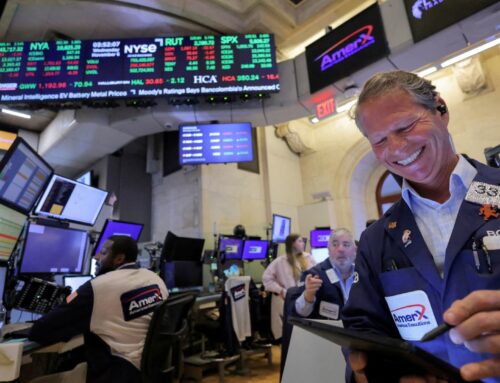Forbes Daily: Alphabet Surges As Google Comes For Nvidia’s AI Business
November 26, 2025
If you find yourself with more time to read this holiday season, try taking a page out of Bill Gates’ book.
In his annual holiday reading list, the billionaire recommended five books, covering everything from fiction to memoir and science. One of the books, Remarkably Bright Creatures, a story about aging, grief and an unlikely friendship with a Pacific octopus, is being made into a Netflix movie next year (and is a personal favorite of this author, too).
Gates’ previous recommendations have made a real impact, including a 2012 endorsement of The Better Angels of Our Nature by Steven Pinker, which led to a 2,000% increase in the book’s sales.
This is a published version of the Forbes Daily newsletter, you can sign-up to get Forbes Daily in your inbox here.
FIRST UP
Google parent Alphabet’s market rally has continued to enrich its founders, as Sergey Brin became the world’s third-richest person Tuesday, besting Oracle’s Larry Ellison. Shares of Alphabet have surged more than 75% since reaching a low in August, and a report that Meta is considering using Google’s AI chips for its data centers and cloud infrastructure boosted the stock further.
MORE: The report that Meta may use Google’s chips sent AI darling Nvidia down Tuesday despite overall stock market gains, continuing a string of losses for the firm that began at the start of the month. Nvidia is still the world’s most valuable company, but Google’s AI chip business could help it snatch 10% of Nvidia’s annual revenue, according to The Information.
BUSINESS + FINANCE
Ahead of delayed federal jobs data next month, a report from payroll processing firm ADP shows accelerated job losses in the private sector. Private sector employers shed an average of 13,500 jobs per week in the four weeks ending November 8—a nearly 20% increase from the previous period in what ADP chief economist Nela Richardson called a “C plus, B minus labor market.”
Bitcoin is on track for its worst monthly performance since the crypto crash three years ago, and U.S. listed exchange-traded funds tracking the price of the cryptocurrency have lost a record $3.7 billion so far in November. Bitcoin has fallen over 35% from its October peak, reversing its post-election gains.
Consumer confidence reached its lowest level since the height of President Donald Trump’s tariffs in April, according to the Conference Board report. The consumer confidence index dropped more than anticipated by economists, as respondents were “notably more pessimistic” about their expectations for business conditions in six months, according to Conference Board chief economist Dana Peterson.
WEALTH + ENTREPRENEURSHIP
Longtime portfolio manager David Green’s $767 million Hotchkis & Wiley Value Opportunities Fund is taking a contrarian stance, hunting for mispriced companies that investors have abandoned in favor of the AI boom. Green has been quietly loading up on unglamorous companies like software maker Workday, telecom-equipment giant Ericsson, and moving-and-storage giant U-Haul, focusing on firms with dominant competitive positions, strong balance sheets and valuations that have been beaten down in a lofty market.
MONEY + POLITICS
Facing legal issues, crypto investors and other related companies seemed to sense an opportunity with President Donald Trump in the White House, and about a dozen have donated to Trump’s political groups, partnered with his crypto ventures and invested in his companies. That’s left the president in a nice position, but throwing money at Trump could invite congressional scrutiny for those companies down the line.
TRAVEL + LIFESTYLE
The Department of the Interior announced fee hikes Tuesday for foreign tourists to access the most visited national parks, a move the administration said would allow U.S. residents to “continue to enjoy affordable access.” Starting January 1, foreign visitors will need to pay $250 to purchase an annual pass to the parks, while those without an annual pass will need to pay a $100 surcharge per person, in addition to the standard fee, to enter popular parks like Yosemite and Grand Canyon.
DAILY COVER STORY
Google’s Hot New AI Coding Tool Was Hacked A Day After Launch
Within 24 hours of Google releasing its Gemini-powered AI coding tool Antigravity, security researcher Aaron Portnoy discovered a severe vulnerability: a trick that allowed him to rewrite the AI’s rules to install malware on a user’s computer.
Antigravity’s vulnerability is the latest example of how companies are pushing out AI products without fully stress testing them for security weaknesses. It’s created a cat and mouse game for cybersecurity specialists who search for such defects to warn users before it’s too late.
“The speed at which we’re finding critical flaws right now feels like hacking in the late 1990s,” Portnoy wrote in a report on the vulnerability, provided to Forbes ahead of public release on Wednesday. “AI systems are shipping with enormous trust assumptions and almost zero hardened boundaries.”
Portnoy reported his findings to Google. The tech giant, which did not respond to a comment request, told him it opened an investigation into his findings. As of Wednesday, there’s no patch available, and Google is aware of two other vulnerabilities in its Antigravity software.
The hurried release of AI tools containing vulnerabilities isn’t limited to Google. Gadi Evron, cofounder and CEO at AI security company Knostic, said AI coding agents were “very vulnerable, often based on older technologies and never patched, and then insecure by design based on how they need to work.” Because they’re given privileges to broadly access data from a corporate network, they make for valuable targets for criminal hackers, Evron told Forbes.
WHY IT MATTERS “Companies are rushing out all manner of AI tools that could be abused to provide secret backdoors into company networks,” says Forbes senior writer Thomas Brewster. “Because coders are typically early adopters of such tech, they’re especially vulnerable. And because AI tools are by design automated, if turned to evil, they can speed up and scale cyberattacks like never before. It’s a dangerous combination.”
MORE AI Hacks AI: Cybercriminals Unleash An AI-Powered, Self-Replicating Botnet
FACTS + COMMENTS
One of the key sticking points in the recent government shutdown was the January expiration of Affordable Care Act subsidies, and Republican leaders are reportedly considering plans to address the upcoming shortfall. The end of the subsidies would require millions to pay higher premiums:
Over 24 million: The number of people currently enrolled in marketplace insurance, the vast majority of whom qualify for the tax credits, according to an analysis from health policy research firm KFF
Two: The number of years Republicans are reportedly considering extending the credits for, in exchange for instituting new income limits
December 15: The enrollment deadline for 2026 ACA plans purchased through Healthcare.gov
STRATEGY + SUCCESS
Gratitude shouldn’t be reserved solely for the Thanksgiving table—it’s also critical for leaders to express appreciation within their organizations throughout the year. Showing you are grateful when employees do well can help build psychological safety, the biggest indicator of performance. Making public gratitude a habit will help uplift you and your team’s spirits.
QUIZ
A major record label settled a lawsuit that had accused the controversial AI music company Suno of training its models on copyrighted material, and the firms said they would form a partnership. Which label is it?
A. Universal Music Group
B. Warner Music Group
C. Sony Music Entertainment
D. Sub Pop Records
Thanks for reading! This edition of Forbes Daily was edited by Sarah Whitmire and Chris Dobstaff.
Search
RECENT PRESS RELEASES
Related Post




